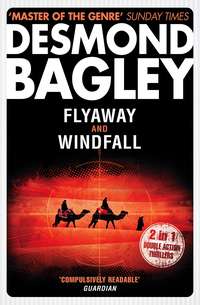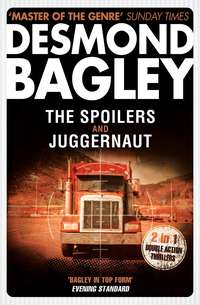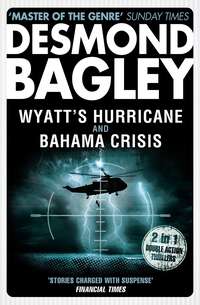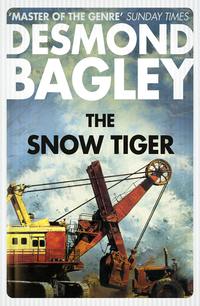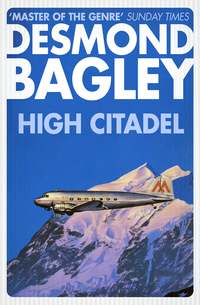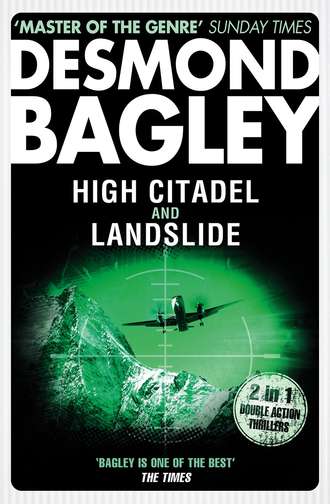
Полная версия
High Citadel / Landslide
They made good time and decided they would be able to have their midday rest and some hot food on the other side of the bridge. ‘A little over five miles in half a day,’ said Forester, chewing on a piece of jerked beef. ‘That won’t be bad going. But I hope to God that Rohde is right when he says that the refinery is still inhabited.’
‘We will be all right,’ said Rohde. ‘There is a village ten miles the other side of the refinery. Some of us can go on and bring back help if necessary.’
They pushed on and found that suddenly they were in the valley. There was no more snow and the ground was rocky, with more clumps of tough grass. The road ceased to twist and they went past many small ponds. It was appreciably warmer too, and O’Hara found that he could stride out without losing his breath.
We’ve got it made, he thought exultantly.
Soon they heard the roar of the river which carried the meltwater from the snowfields behind them and suddenly they were all gay. Miss Ponsky chattered unceasingly, exclaiming once in her high-pitched voice as she saw a bird, the first living, moving thing they had seen in two days. O’Hara heard Aguillar’s deep chuckle and even Peabody cheered up, recovering from Forester’s tonguelashing.
O’Hara found himself next to Benedetta. She smiled at him and said, ‘Who has the pressure stove? We are going to need it soon.’
He pointed back to where Willis and Armstrong were pulling the travois. ‘I packed it in there,’ he said.
They were very near the river now and he estimated that the road would have one last turn before they came to the bridge. ‘Come on,’ he said. ‘Let’s see what’s round the corner.’
They stepped out and round the curve and O’Hara suddenly stopped. There were men and vehicles on the other side of the swollen river and the bridge was down.
A faint babble of voices arose above the river’s roar as they were seen and some of the men on the other side started to run. O’Hara saw a man reach into the back of a truck and lift out a rifle and there was a popping noise as others opened up with pistols.
He lurched violently into Benedetta, sending her flying just as the rifle cracked, and she stumbled into cover, dropping some cans in the middle of the road. As O’Hara fell after her one of the cans suddenly leaped into the air as a bullet hit it, and leaked a tomato bloodiness.
THREE
O’Hara, Forester and Rohde looked down on the bridge from the cover of a group of large boulders near the edge of the river gorge. Below, the river rumbled, a green torrent of ice-water smoothly slipping past the walls it had cut over the aeons. The gorge was about fifty yards wide.
O’Hara was still shaking from the shock of being unexpectedly fired upon. He had thrown himself into the side of the road, winding himself by falling on to a can in the pocket of his overcoat. When he recovered his breath he had looked with stupefaction at the punctured can in the middle of the road, bleeding a red tomato and meat gravy. That could have been me, he thought – or Benedetta.
It was then that he started to shake.
They had crept back round the corner, keeping in cover, while rifle bullets flicked chips of granite from the road surface. Rohde was waiting for them, his gun drawn and his face anxious. He looked at Benedetta’s face and his lips drew back over his teeth in a snarl as he took a step forward.
‘Hold it,’ said Forester quietly from behind him. ‘Let’s not be too hasty.’ He put his hand on O’Hara’s arm. ‘What’s happening back there?’
O’Hara took a grip on himself. ‘I didn’t have time to see much. I think the bridge is down; there are some trucks on the other side and there seemed to be a hell of a lot of men.’
Forester scanned the ground with a practised eye. ‘There’s plenty of cover by the river – we should be able to get a good view from among those rocks without being spotted. Let’s go.’
So here they were, looking at the ant-like activity on the other side of the river. There seemed to be about twenty men; some were busy unloading thick planks from a truck, others were cutting rope into lengths. Three men had apparently been detailed off as sentries; they were standing with rifles in their hands, scanning the bank of the gorge. As they watched, one of the men must have thought he saw something move, because he raised his rifle and fired a shot.
Forester said, ‘Nervous, aren’t they? They’re firing at shadows.’
O’Hara studied the gorge. The river was deep and ran fast – it was obviously impossible to swim. One would be swept away helplessly in the grip of that rush of water and be frozen to death in ten minutes. Apart from that, there were the problems of climbing down the edge of the gorge to the water’s edge and getting up the other side, not to mention the likelihood of being shot.
He crossed the river off his mental list of possibilities and turned his attention to the bridge. It was a primitive suspension contraption with two rope catenaries strung from massive stone buttresses on each side of the gorge. From the catenaries other ropes, graded in length, supported the main roadway of the bridge which was made of planks. But there was a gap in the middle where a lot of planks were missing and the ropes dangled in the breeze.
Forester said softly, ‘That’s why they didn’t meet us at the airstrip. See the truck in the river – downstream, slapped up against the side of the gorge?’
O’Hara looked and saw the truck in the water, almost totally submerged, with a standing wave of water swirling over the top of the cab. He looked back at the bridge. ‘It seems as though it was crossing from this side when it went over.’
‘That figures,’ said Forester. ‘I reckon they’d have a couple of men to make the preliminary arrangements – stocking up the camp and so on – in readiness for the main party. When the main party was due they came down to the bridge to cross – God knows for what reason. But they didn’t make it – and they buggered the bridge, with the main party still on the other side.’
‘They’re repairing it now,’ said O’Hara. ‘Look.’
Two men crawled on to the swaying bridge pushing a plank before them. They lashed it into place with the aid of a barrage of shouted advice from terra firma and then retreated. O’Hara looked at his watch; it had taken them half an hour.
‘How many planks to go?’ he asked.
Rohde grunted. ‘About thirty.’
‘That gives us fifteen hours before they’re across,’ said O’Hara.
‘More than that,’ said Forester. ‘They’re not likely to do that trapeze act in the dark.’
Rohde took out his pistol and carefully sighted on the bridge, using his forearm as a rest. Forester said, ‘That’s no damned use – you won’t hit anything at fifty yards with a pistol.’
‘I can try,’ said Rohde.
Forester sighed. ‘All right,’ he conceded. ‘But just one shot to see how it goes. How many slugs have you got?’
‘I had two magazines with seven bullets in each,’ said Rohde. ‘I have fired three shots.’
‘You pop off another and that leaves ten. That’s not too many.’
Rohde tightened his lips stubbornly and kept the pistol where it was. Forester winked at O’Hara and said, ‘If you don’t mind I’m going to retire now. As soon as you start shooting they’re going to shoot right back.’
He withdrew slowly, then turned and lay on his back and looked at the sky, gesturing for O’Hara to join him. ‘It looks as though the time is ripe to hold our council of war,’ he said. ‘Surrender or fight. But there may be a way out of it – have you got that air chart of yours?’
O’Hara produced it. ‘We can’t cross the river – not here, at least,’ he said.
Forester spread out the chart and studied it. He put his finger down. ‘Here’s the river – and this is where we are. This bridge isn’t shown. What’s this shading by the river?’
‘That’s the gorge.’
Forester whistled. ‘Hell, it starts pretty high in the mountains, so we can’t get around it upstream. What about the other way?’
O’Hara measured off the distance roughly. ‘The gorge stretches for about eighty miles down stream, but there’s a bridge marked here – fifty miles away, as near as dammit.’
‘That’s a hell of a long way,’ commented Forester. ‘I doubt if the old man could make it – not over mountain country.’
O’Hara said, ‘And if that crowd over there have any sense they’ll have another truckload of men waiting for us if we do try it. They have the advantage of being able to travel fast on the lower roads.’
‘The bastards have got us boxed in,’ said Forester. ‘So it’s surrender or fight.’
‘I surrender to no communists,’ said O’Hara.
There was a flat report as Rohde fired his pistol and, almost immediately, an answering fusillade of rifle shots, the sound redoubled by echoes from the high ground behind. A bullet ricocheted from close by and whined over O’Hara’s head.
Rohde came slithering down. ‘I missed,’ he said.
Forester refrained from saying, ‘I told you so,’ but his expression showed it. Rohde grinned. ‘But it stopped them working on the bridge – they went back fast and the plank dropped in the river.’
‘That’s something,’ said O’Hara. ‘Maybe we can hold them off that way.’
‘For how long?’ asked Forester. ‘We can’t hold them off for ever – not with ten slugs. We’d better hold our council of war. You stay here, Miguel; but choose a different observation point – they might have spotted this one.’
O’Hara and Forester went back to the group on the road. As they approached O’Hara said in a low voice, ‘We’d better do something to ginger this lot up; they look too bloody nervous.’
There was a feeling of tension in the air. Peabody was muttering in a low voice to Miss Ponsky, who for once was silent herself. Willis was sitting on a rock, nervously tapping his foot on the ground, and Aguillar was speaking rapidly to Benedetta some little way removed from the group. The only one at ease seemed to be Armstrong, who was placidly sucking on an empty pipe, idly engaged in drawing patterns on the ground with a stick.
O’Hara crossed to Aguillar. ‘We’re going to decide what to do,’ he said. ‘As you suggested.’
Aguillar nodded gravely. ‘I said that it must happen.’
O’Hara said, ‘You’re going to be all right.’ He looked at Benedetta; her face was pale and her eyes were dark smudges in her head. He said, ‘I don’t know how long this is going to take, but why don’t you begin preparing a meal for us. We’ll all feel better when we’ve eaten.’
‘Yes, child,’ said Aguillar. ‘I will help you. I am a good cook, Señor O’Hara.’
O’Hara smiled at Benedetta. ‘I’ll leave you to it, then.’
He walked over to where Forester was giving a pep talk. ‘And that’s the position,’ he was saying. ‘We’re boxed in and there doesn’t seem to be any way out of it – but there is always a way out of anything, using brains and determination. Anyway, it’s a case of surrender or fight. I’m going to fight – and so is Tim O’Hara here; aren’t you, Tim?’
‘I am,’ said O’Hara grimly.
‘I’m going to go round and ask your views, and you must each make your own decision,’ continued Forester. ‘What about you, Doctor Willis?’
Willis looked up and his face was strained. ‘It’s difficult, isn’t it? You see, I’m not much of a fighter. Then again, it’s a question of the odds – can we win? I don’t see much reason in putting up a fight if we’re certain of losing – and I don’t see any chance at all of our winning out.’ He paused, then said hesitantly, ‘But I’ll go with the majority vote.’
Willis, you bastard, you’re a fine example of a fencesitter, thought O’Hara.
‘Peabody?’ Forester’s voice cut like a lash.
‘What the hell has this got to do with us?’ exploded Peabody. ‘I’m damned if I’m going to risk my life for any wop politician. I say hand the bastard over and let’s get the hell out of here.’
‘What do you say, Miss Ponsky?’
She gave Peabody a look of scorn, then hesitated. All the talk seemed to be knocked out of her, leaving her curiously deflated. At last she said in a small voice, ‘I know I’m only a woman and I can’t do much in the way of fighting, and I’m scared to death – but I think we ought to fight.’ She ended in a rush and looked defiantly at Peabody. ‘And that’s my vote.’
Good for you, Miss Ponsky, cheered O’Hara silently. That’s three to fight. It’s now up to Armstrong – he can tip it for fighting or make a deadlock, depending on his vote.
‘Doctor Armstrong, what do you have to say?’ queried Forester.
Armstrong sucked on his pipe and it made an obscene noise. ‘I suppose I’m more an authority on this kind of situation than anyone present,’ he observed. ‘With the possible exception of Señor Aguillar, who at present is cooking our lunch, I see. Give me a couple of hours and I could quote a hundred parallel examples drawn from history.’
Peabody muttered in exasperation, ‘What the hell!’
‘The question at issue is whether to hand Señor Aguillar to the gentlemen on the other side of the river. The important point, as I see it affecting us, is what would they do with him? And I can’t really see that there is anything they can do with him other than kill him. Keeping high-standing politicians as prisoners went out of fashion a long time ago. Now, if they kill him they will automatically be forced to kill us. They would not dare take the risk of letting this story loose upon the world. They would be most painfully criticized, perhaps to the point of losing what they have set out to gain. In short, the people of Cordillera would not stand for it. So you see, we are not fighting for the life of Señor Aguillar; we are fighting for our own lives.’
He put his pipe back into his mouth and made another rude noise.
‘Does that mean that you are in favour of fighting?’ asked Forester.
‘Of course,’ said Armstrong in surprise. ‘Haven’t you been listening to what I’ve been saying?’
Peabody looked at him in horror. ‘Jesus!’ he said. ‘What have I got myself into?’ He buried his head in his hands.
Forester grinned at O’Hara, and said, ‘Well, Doctor Willis?’
‘I fight,’ said Willis briefly.
O’Hara chuckled. One academic man had convinced another.
Forester said, ‘Ready to change your mind, Peabody?’
Peabody looked up. ‘You really think they’re going to rub us all out?’
‘If they kill Aguillar I don’t see what else they can do,’ said Armstrong reasonably. ‘And they will kill Aguillar, you know.’
‘Oh, hell,’ said Peabody in an anguish of indecision.
‘Come on,’ Forester ordered harshly. ‘Put up or shut up.’
‘I guess I’ll have to throw in with you,’ Peabody said morosely.
‘That’s it, then,’ said Forester. ‘A unanimous vote. I’ll tell Aguillar and we’ll discuss how to fight over some food.’ Miss Ponsky went to help the Aguillars with their cooking and O’Hara went back to the river to see what Rohde was doing. He looked back and saw that Armstrong was talking to Willis and again drawing on the ground with a stick. Willis looked interested.
Rohde had chosen a better place for observation and at first O’Hara could not find him. At last he saw the sole of a boot protruding from behind a rock and joined Rohde, who seemed pleased. ‘They have not yet come out of their holes,’ he said. ‘It has been an hour. One bullet that missed has held them up for an hour.’
‘That’s great,’ said O’Hara sardonically. ‘Ten bullets – ten hours.’
‘It is better than that,’ protested Rohde. ‘They have thirty planks to put in – that would take them fifteen hours without my bullets. With the shooting it will take them twenty-five hours. They will not work at night – so that is two full days.’
O’Hara nodded. ‘It gives us time to decide what to do next,’ he admitted. But when the bullets were finished and the bridge completed a score of armed and ruthless men would come boiling over the river. It would be a slaughter.
‘I will stay here,’ said Rohde. ‘Send some food when it is ready.’ He nodded towards the bridge. ‘It takes a brave man to walk on that, knowing that someone will shoot at him. I do not think these men are very brave – maybe it will be more than one hour to a bullet.’
O’Hara went back and told Forester what was happening and Forester grimaced. ‘Two days – maybe – two days to come up with something. But with what?’
O’Hara said, ‘I think a Committee of Ways and Means is indicated.’
They all sat in a circle on the sparse grass and Benedetta and Miss Ponsky served the food on the aluminium plates they had found at the camp. Forester said, ‘This is a war council, so please stick to the point and let’s have no idle chit-chat – we’ve no time to waste. Any sensible suggestions will be welcome.’
There was a dead silence, then Miss Ponsky said, ‘I suppose the main problem is to stop them repairing the bridge. Well, couldn’t we do something at this end – cut the ropes or something?’
‘That’s good in principle,’ said Forester. ‘Any objections to it?’ He glanced at O’Hara, knowing what he would say.
O’Hara looked at Forester sourly; it seemed as though he was being cast as the cold-water expert and he did not fancy the role. He said deliberately, ‘The approaches to the bridge from this side are wide open; there’s no cover for at least a hundred yards – you saw what happened to Benedetta and me this morning. Anyone who tried to get to the bridge along the road would be cut down before he’d got halfway. It’s point blank range, you know – they don’t have to be crack shots.’ He paused. ‘Now I know it’s the only way we can get at the bridge, but it seems impossible to me.’
‘What about a night attack?’ asked Willis.
‘That sounds good,’ said Forester.
O’Hara hated to do it, but he spoke up. ‘I don’t want to sound pessimistic, but I don’t think those chaps over there are entirely stupid. They’ve got two trucks and four jeeps, maybe more, and those vehicles have at least two headlights apiece. They’ll keep the bridge well lit during the dark hours.’
There was silence again.
Armstrong cleared his throat. ‘Willis and I have been doing a little thinking and maybe we have something that will help. Again I find myself in the position of being something of an expert. You know that my work is the study of medieval history, but it so happens that I’m a specialist, and my speciality is medieval warfare. The position as I see it is that we are in a castle with a moat and a drawbridge. The drawbridge is fortuitously pulled up, but our enemies are trying to rectify that state of affairs. Our job is to stop them.’
‘With what?’ asked O’Hara. ‘A push of a pike?’
‘I wouldn’t despise medieval weapons too much, O’Hara,’ said Armstrong mildly. ‘I admit that the people of those days weren’t as adept in the art of slaughter as we are, but still, they managed to kill each other off at a satisfactory rate. Now, Rohde’s pistol is highly inaccurate at the range he is forced to use. What we want is a more efficient missile weapon than Rohde’s pistol.’
‘So we all make like Robin Hood,’ said Peabody derisively. ‘With the jolly old longbow, what? For Christ’s sake, Professor!’
‘Oh, no,’ said Armstrong. ‘A longbow is very chancy in the hands of a novice. It takes five years at least to train a good bowman.’
‘I can use the bow,’ said Miss Ponsky unexpectedly. Everyone looked at her and she coloured. ‘I’m president of the South Bridge Ladies’ Greenwood Club. Last year I won our own little championship in the Hereford Round.’
‘That’s interesting,’ said Armstrong.
O’Hara said, ‘Can you use a longbow lying down, Miss Ponsky?’
‘It would be difficult,’ she said. ‘Perhaps impossible.’
O’Hara jerked his head at the gorge. ‘You stand up there with a longbow and you’ll get filled full of holes.’
She bridled. ‘I think you’d do better helping than pouring cold water on all our ideas, Mr O’Hara.’
‘I’ve got to do it,’ said O’Hara evenly. ‘I don’t want anyone killed uselessly.’
‘For God’s sake,’ exclaimed Willis. ‘How did a longbow come into this? That’s out – we can’t make one; we haven’t the material. Now, will you listen to Armstrong; he has a point to make.’ His voice was unexpectedly firm.
The flat crack of Rohde’s pistol echoed on the afternoon air and there was the answering fire of shots from the other side of the gorge. Peabody ducked and O’Hara looked at his watch. It had been an hour and twenty minutes – and they had nine bullets left.
Forester said, ‘That’s one good thing – we’re safe here. Their rifles won’t shoot round corners. Make your point, Doctor Armstrong.’
‘I was thinking of something more on the lines of a prodd or crossbow,’ said Armstrong. ‘Anyone who can use a rifle can use a crossbow and it has an effective range of over a hundred yards.’ He smiled at O’Hara. ‘You can shoot it lying down, too.’
O’Hara’s mind jumped at it. They could cover the bridge and also the road on the other side where it turned north and followed the edge of the gorge and where the enemy trucks were. He said, ‘Does it have any penetrative power?’
‘A bolt will go through mail if it hits squarely,’ said Armstrong.
‘What about a petrol tank?’
‘Oh, it would penetrate a petrol tank quite easily.’
‘Now, take it easy,’ said Forester. ‘How in hell can we make a crossbow?’
‘You must understand that I’m merely a theoretician where this is concerned,’ explained Armstrong. ‘I’m no mechanic or engineer. But I described what I want to Willis and he thinks we can make it.’
‘Armstrong and I were rooting round up at the camp,’ said Willis. ‘One of the huts had been a workshop and there was a lot of junk lying about – you know, the usual bits and pieces that you find in a metal-working shop. I reckon they didn’t think it worthwhile carting the stuff away when they abandoned the place. There are some flat springs and odd bits of metal rod; and there’s some of that concrete reinforcing steel that we can cut up to make arrows.’
‘Bolts,’ Armstrong corrected mildly. ‘Or quarrels, if you prefer. I thought first of making a prodd, you know; that’s a type of crossbow which fires bullets, but Willis has convinced me that we can manufacture bolts more easily.’
‘What about tools?’ asked O’Hara. ‘Have you anything that will cut metal?’
‘There are some old hacksaw blades,’ Willis said. ‘And I saw a couple of worn-out files. And there’s a hand-powered grindstone that looks as though it came out of the Ark. I’ll make out; I’m good with my hands and I can adapt Armstrong’s designs with the material available.’
O’Hara looked at Forester, who said slowly, ‘A weapon accurate to a hundred yards built out of junk seems too good to be true. Are you certain about this, Doctor Armstrong?’
‘Oh, yes,’ said Armstrong cheerfully. ‘The crossbow has killed thousands of men in its time – I see no reason why it shouldn’t kill a few more. And Willis seems to think he can make it.’ He smiled. ‘I’ve drawn the blueprints there.’ He pointed to a few lines scratched in the dust.
‘If we’re going to do this, we’d better do it quickly,’ said O’Hara.
‘Right.’ Forester looked up at the sun. ‘You’ve got time to make it up to the camp by nightfall. It’s uphill, but you’ll be travelling light. You go too, Peabody; Willis can use another pair of hands.’
Peabody nodded quickly. He had no taste for staying too near the bridge.
‘One moment,’ said Aguillar, speaking for the first time. ‘The bridge is made of rope and wood – very combustible materials. Have you considered the use of fire? Señor O’Hara gave me the idea when he spoke of petrol tanks.’
‘Um,’ said O’Hara. ‘But how to get the fire to the bridge?’
‘Everyone think of that,’ said Forester. ‘Now let’s get things moving.’


